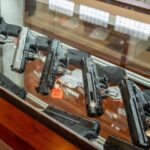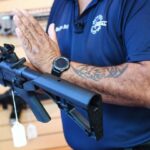By Katabella Roberts
A federal judge has granted a preliminary injunction against key parts of California’s Unsafe Handgun Act that would require new semiautomatic handguns to be fitted with certain safety features, finding it violates the right to bear arms under the Second Amendment of the U.S. Constitution.
U.S. District Judge Cormac Carney on March 20 ruled in favor of the California Rifle & Pistol Association (CRPA) and four individuals who had filed a lawsuit last year challenging the constitutionality of the law in the wake of a landmark decision from the U.S. Supreme Court setting new standards for evaluating firearm restrictions.
California’s Unsafe Handgun Act, which was enacted in 1999, sought to prevent accidental discharges according to advocates, and required new handguns to have three specific safety features.
These included an indicator showing whether the handgun is loaded and a disconnect mechanism to prevent it from being fired if the magazine is not fully inserted.
Under the law, new handguns also needed to have microstamping capability, enabling microscopic characters representing the handgun’s make, model, and serial number to be transferred onto shell casings when the handgun is fired so that law enforcement officials can more easily link the used casings to the guns they were fired from.
Safety Features Not ‘Commercially Practical’
In their lawsuit, plaintiffs had argued that the law violates the Second Amendment right to keep and bear arms because no handguns were being manufactured that complied with all three of those features.
Specifically, they argued that the law and subsequent design features meant that buyers in the state had simply been left unable to purchase new state-of-the-art handguns because since 2013, when the microstamping requirement was introduced, not a single new semiautomatic handgun has been approved for sale in the state.
In his ruling on Monday (pdf), Carney—who was appointed by former President George W. Bush—noted that the technology effectuating microstamping on a broad scale is “simply not technologically feasible and commercially practical,” and that as a result of the law, Californian’s purchasing handguns today are “largely restricted to models from over sixteen years ago.”
“The Second Amendment enshrines a fundamental constitutional right for law-abiding citizens to keep and bear arms for self-defense,” the judge wrote. “Increasingly in modern times, with ‘the ubiquity of guns and our country’s high level of gun violence,’ ordinary law-abiding people feel a need to possess handguns to protect themselves against violence.”
“Californians have the constitutional right to acquire and use state-of-the-art handguns to protect themselves. They should not be forced to settle for decade-old models of handguns to ensure that they remain safe inside or outside the home. But unfortunately, the UHA’s CLI, MDM, and microstamping requirements do exactly that,” Carney continued.
“Because enforcing those requirements implicates the plain text of the Second Amendment, and the government fails to point to any well-established historical analogues that are consistent with them, those requirements are unconstitutional and their enforcement must be preliminarily enjoined,” the judge wrote in his ruling.
State Could Appeal Ruling
The judge ultimately ruled that the law is unconstitutional and cannot be enforced and granted a preliminary injunction against its enforcement. However, he noted the injunction will not take effect for 14 days, allowing the state a chance to appeal.
Monday’s ruling is the latest in a line of decisions striking down state gun laws following the U.S. Supreme Court ruling last year setting new standards for evaluating firearm restrictions.
Chuck Michel, president of the California Rifle & Pistol Association, welcomed Monday’s ruling in a statement, noting that the three safety features required on new handguns were “impossible to satisfy.”
“For decades this ‘roster’ law has deprived law-abiding citizens of the right to choose a handgun appropriate for their individual needs,” Michel said. “If we can hold on to this great Second Amendment win, people will be able to choose from among thousands of the latest, greatest, and safest handguns made today.”
However, California Attorney General Rob Bonta championed California’s Unsafe Handgun Act in a statement, adding that it “saves lives” and that the state will likely appeal Monday’s ruling.
“We will continue to lead efforts to advance and defend California’s gun safety laws,” said Bonta. “As we move forward to determine next steps in this case, Californians should know that this injunction has not gone into effect and that California’s important gun safety requirements related to the Unsafe Handgun Act remain in effect.”
The Associated Press contributed to this report.






